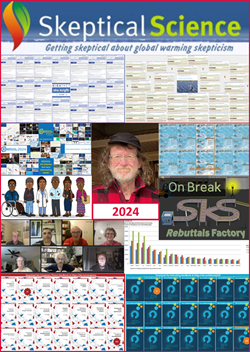
The year 2024 at Skeptical Science has been bittersweet. We are incredibly proud of the progress we've made in debunking climate myths, thanks in large part to the tireless efforts of our late colleague John Mason. John passed away unexpectedly in September, leaving a huge void in our team. This post is a tribute to his immense contributions and the lasting impact he'll have on climate science education for years to come.
As in previous recaps, this one is divided into several sections:
 |
Several members of the SkS-team were lead- or co-authors of peer-reviewed and conference papers published during 2024. Here is a list of some of them:
Combining different inoculation types to increase student engagement and build resilience against science misinformation
Melanie Trecek-King and John Cook (Trecek-King & Cook 2024). Just like vaccines protect us from diseases, inoculation theory can protect us from misinformation by exposing ourselves to weakened misinformation in order to build up resistance. This paper describes three inoculation techniques that can be used in the classroom: passive inoculation, where we simply receive information; active inoculation, where we actively create misinformation ourselves; and experiential inoculation, where we are deliberately misled and then shown how it happened.
Developing a Critical Response to Ad Hominem Attacks Against Climate Science
Sergej A. Samoilenko and John Cook (Samoilenko & Cook 2024). Ad hominem attacks against climate scientists—including personal attacks questioning an individual’s character, competence, or motives—are the most common type of climate misinformation. This study adapts Douglas Walton’s critical framework for analysing ad hominem attacks and applies them to attacks against the climate community, evaluating them for rhetorical errors. This article offers guidance for future inoculation interventions against ad hominem attacks targeting climate science.
Hierarchical machine learning models can identify stimuli of climate change misinformation on social media
Cristian Rojas, Frank Algra-Maschio, Mark Andrejevic, Travis Coan, John Cook & Yuan-Fang Li (Rojas et al. 2024). We adapted the CARDS model originally developed to detect and categorise climate misinformation on blogs and used it to categorise climate misinformation on Twitter over a six month period. We found that ad hominem attacks against climate actors (e.g., scientists, activists) comprised 40% of climate misinformation on Twitter, with conspiracy theories comprise another 20%. In other words, more than half of climate misinformation on Twitter involved attacking and undermining climate scientists.
A technocognitive approach to detecting fallacies in climate misinformation
Francisco Zanartu, John Cook, Markus Wagner and Julian Garciá (Zanartu et al. 2024). Another collaboration between John Cook and computer scientists from Monash University, this work focused on training a machine learning model to detect logical fallacies in climate misinformation. This study made a significant step forward on past efforts, showing 2.5 to 3.5 times better performance in detecting logical fallacies. This work is part of a larger research project focused on “generative debunking” - using AI to automatically generate debunkings of climate misinformation (see Conferences for more on this research).
Co-designing and Pilot Testing a Digital Game to Improve Vaccine Attitudes and Misinformation Resistance in Ghana
John Cook, Chelsey Lepage, Kathryn L. Hopkins, Wendy Cook, Emmanuel Awuni Kolog, Angus Thomson, Iddi Iddrisu &Siobhan Burnette (Cook et al. 2024). This is the first empirical Cranky Uncle study - a pilot study conducted in Ghana testing the Cranky Uncle Vaccine game. We found that the game improved people’s discernment - their ability to distinguish vaccine facts from misinformation. We also found that the game improved players’ attitudes towards vaccines. The improvement was greatest among people who were vaccine hesitant - more than half the people who indicated they were unlikely to get vaccinated at the start of the game switched to being likely to get vaccinated after playing the game.
A NASA GISTEMPv4 Observational Uncertainty Ensemble
Nathan Lenssen, Gavin A. Schmidt, Michael Hendrickson, Peter Jacobs, Matthew J. Menne, Reto Ruedy (Lenssen et al. 2024). NASA's historical surface temperature product, GISTEMP, combines measurements of sea surface temperature and land surface air temperature to estimate how temperature has changed on Earth since 1880. In this study, we combine all known sources of uncertainty in these measurements to determine the best estimate as well as the likely interval for surface temperature in the global average as well as on a latitude-longitude grid. Results agree with previous uncertainty assessments of GISTEMP as well as uncertainty assessments of other major global temperature products. The uncertainty is quantified through an uncertainty ensemble, or 200 equally likely reconstructions of monthly mean surface temperature. This uncertainty ensemble makes it easy to incorporate the uncertainty in surface temperature in subsequent studies.
Large-ensemble Monte Carlo: a researcher's guide to better climate trend uncertainties
Zachary I Glaser, Mark T Richardson, and Felix W Landerer (Glaser et al. 2024). This paper is about a method for calculating uncertainties on trends to do a better job of understanding when something is natural variability or not.
Interchangeability of multi-decade skin and surface air temperature trends over land in models
Mark T Richardson (Richardson 2024). Mark looked at how trends in the land temperature and air above could change vs each other. It's complicated and depends on things like how plants change. Many satellites measure the temperature of the land (or plants) while thermometers at weather stations usually measure the air. So be cautious when comparing their trends.
Why misinformation must not be ignored
Ullrich K. H. Ecker, Li Qian Tay, Jon Roozenbeek, Sander van der Linden, John Cook, Naomi Oreskes and Stephan Lewandowsky (Ecker et al. 2024). In this article the authors refute claims that misinformation is an insignificant issue. Through a critical literature review, they demonstrate that misinformation represents a nontrivial part of the information environment and can causally and adversely influence people’s beliefs, decisions, and behaviors. They clarify through their discussion why misinformation continues to be a significant problem that should not be ignored by communicators and policymakers.
As in previous years, Bärbel Winkler participated in this year's General Assembly of the European Geosciences Union. Instead of travelling to Vienna, she made good use of the conference's hybrid format and participated and contributed virtually in the week of April 14 to 19. Bärbel had a presention in Tuesday's Education and Outreach session (EOS1.8) Telling climate stories: platforms, tools, and methodologies for accurate and engaging science communication in which she highlighted some of our Resources to give facts a fighting chance against misinformation: our rebuttals updates factory, the quick debunking of "Climate the Movie", the Debunking Handbook, the Conspiracy Theory handbook, the FLICC taxonomy of science denial techniques and how to learn about them with the help of the Cranky Uncle game.
Wednesday started with Union Symposia (US6) Misunderstanding or malice? Getting to the bottom of geoscience disinformation with Bärbel as one of the invited panelists for this almost 2 hour long session. This Union Symposia was convended by Flora Maria Brocza with Chloe Hill, Viktor J. Bruckman, Kirsten v. Elverfeldt and Christina West as co-conveners. The other speakers for the session were Gaura Naithani (Project Manager & Researcher, European Journalism Centre) and Simon Clark (Science communicator & author). Check out Bärbel's EGU diary for a day-by-day account of the happenings.
Yulia Otmakhova and Lea Frermann presented their research into AI debunking (in collaboration with John Cook) at the ClimateNLP 2024 Workshop held in Bangkok on August 16:
Generative Debunking of Climate Misinformation
Francisco Zanartu, Yulia Otmakhova, John Cook, Lea Frermann
Given the firehose of falsehoods about climate change spreading online, this research explores using AI to automatically detect and debunk climate misinformation. We tested three different large language models (Mixtral, Palm2, ChatGPT) with varying levels of complexity. The best performing model was the most complex - the open-source Mixtral model drawing upon a newly developed model that detects logical fallacies. Overall, we found promising potential in using AI to generate debunkings that adheres to the fact-myth-fallacy-fact ("truth sandwich'') structure. (Details)
Peter Jacobs presented two posters at the American Geophysical Union (AGU) annual meeting held in Washington D.C. from Dec 9 to 13:
Assessing the Robustness of Record 2023 and 2024 Warming from Daily to Annual Timescales Across Global Reanalysis Products
Co-Authors: Michael G Bosilovich, Allison Collow, Reto Ruedy, Gavin A Schmidt
To date, monthly and annual surface instrumental global temperature records have shown broad agreement regarding the record warming of 2023 and 2024. Provisional analyses from model assimilated (re)analysis products including MERRA-2, GEOS-FP, and ERA-5 likewise appear to agree well down to the daily timescale, but only when care is taken to account for important differences in mean climatic states. This work explores the robustness of recent record global temperatures across such data products, identifying agreement at daily to annual timescales across reanalyses as well as with surface instrumental products. Differences in mean states, seasonality, and lingering discontinuities complicate straightforward comparisons of extant data products.
Integrating Near-Real-Time GEOS-FP Analysis and MERRA-2 Reanalysis Global Temperature Data
Co-Authors: Michael G Bosilovich, Allison Collow, Reto Ruedy, Gavin A Schmidt
Two novel use cases are presented for integrating the GEOS-FP near-real-time analysis and the MERRA-2 reanalysis for assessing global temperature data. The first considers the use of GEOS-FP and MERRA-2 global temperature data to create pseudo-anomaly products for the purposes of detecting potential outliers in GHCN surface instrumental data prior to their inclusion in the GISTEMP global surface temperature analysis. The second illustrates how the GEOS-FP and MERRA-2 products can be carefully aligned to provide a near-real-time look at the record breaking daily temperature seen at the global scale in July 2023 and July 2024.
Several presenations, podcasts and interviews were recorded during the year and you can see some of them listed on our talks page:
[youtube id="AdgRr5auHLY"]
In May 2024 we added Romanian to the Cranky Uncle game and shortly before the holidays in December the Catalan, Croatian, and Indonesian languages became available via the browser version of the game. Polish is in the final stages of testing, so will follow suit soon. Sometime in January, these languages will also become available in the iOS and Android app stores, getting us to 17 languages the game can be played in! These translations were created by translator teams scattered around the globe and put together by the professional team of creative agency Goodbeast. The blog post about the Cranky Game's translations explains the game's history and goes into fascinating details of what all is involved with these translations and especially the "fun with ambiguities" the translator teams had!
Since February, the Teacher's Guide to Cranky Uncle is also available in Albanian and Macedonian, thanks to the efforts of the Institute of Communication studies in Skopje who had prepared the game's translation into these two languages last year! Both have been downloaded about 150 times each since becoming available. Speaking of downloads, the German translation was downloaded almost 1,900 times and the English version 850 times, followed by Dutch (530), Spanish (300+) and Portuguese (260).
In January, John Cook and colleagues had a paper published in the Journal of Health Communication documenting how we co-designed the East African version of the Cranky Uncle Vaccine game. In a blog post, John explains the co-design and development of the Cranky Uncle Vaccine game in East Africa. The game, adapted from the original Cranky Uncle game, uses a combination of logic-based and fact-based inoculation to build resilience against vaccine misinformation. Co-design workshops in Uganda, Kenya, and Rwanda were crucial in adapting the game to local cultural contexts, refining character designs, and ensuring cultural relevance. The process involved iterative feedback and collaborative design with local participants, leading to a culturally sensitive and effective game.
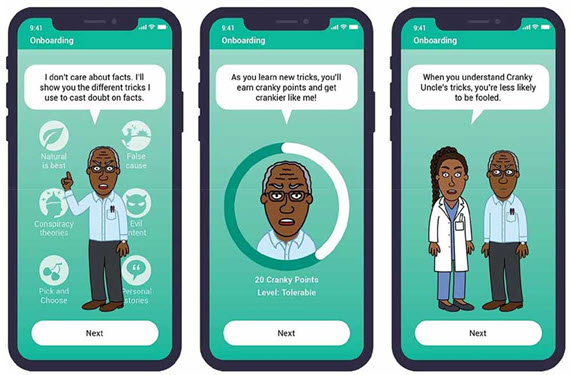
The original purpose of developing CARDS - using AI to detect climate misinformation - was to ultimately develop a model for automatically debunking online climate misinformation. We made significant progress towards that goal in 2024. First, we developed the FLICC model for detecting logical fallacies in climate misinformation, publishing this research in Scientific Reports. Next, we incorporated the FLICC model and CARDS model in an AI model that uses generative AI to debunk climate myths. We presented preliminary findings for this research at a Natural Language Processing conference in Bangkok. In 2025, we will continue to develop and assess our AI model as well as publish an online tool allowing the public to access the model’s output.
Our Massive Open Online Course (MOOC) Denial101x came to a close at the end of February when last year's run finished and no subsequent run had been prepared by UQx on the edX platform. So, sadly, Denial101x has run its course (pun intended), but we are happy to report that many of its resources will stay available, like the big collection of lecture videos and expert interviews as well as the list of references. We received an overall summary about our MOOC from UQx, providing some interesting details across the 15 runs of Denial101x. We had almost 51,000 participants and the data shows a very high degree of learner satisfaction with Denial101x. The participants scored the course very highly, and their sentiments are that the vast majority achieved the learning goals put forward at the beginning of the course. Some of the same questions were asked pre- and post-course, and a comparison of the data demonstrates the positive effects of the students’ learning experience on their collective attitudes and behaviours related to climate change. One other noteworthy point is that word of mouth was the most common way the participants learned about the Denial101x course.
Having to say good-bye to John Mason
As mentioned above, our valued and long-time team member John Mason passed away unexpectedly in September leaving a big void within our team. John was a gifted writer and he penned many longform articles for Skeptical Science over the years. He was also instrumental to set up our rebuttal updates factory and without him, it's quite unlikely that we would have managed to update around 70 basic level rebuttals since February 2023. Here is a collection of personal memories our team members have about John.
Carbon Brief Quiz
On November 7 we participated for the third time in the annual Quiz Night organized by Carbon Brief. The event was held as a hybrid event with some teams gathering at Octopus Energy's headquarters in central London and many others joining via Zoom. In total, 55 teams participated – 30 teams in person and 25 teams joining via Zoom. Compared to last year, when we ended up in 6th place we did a lot worse this time around and made 36th place with 40 out of 100 possible points. Simply participating in an event like this is fun, so we plan to do so again next year with a hopefully bigger team to be able to cover a wider range of questions thrown at us! You can read about the event over at Carbon Brief where detailed stats are available as well as all the quiz questions and their answers.
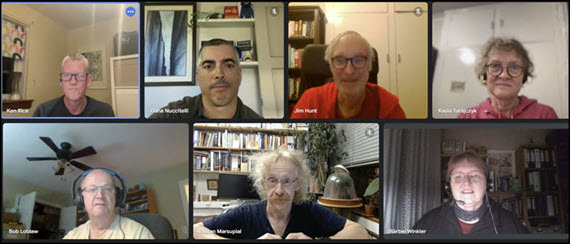
For this year's summary we determined the Top-30 most viewed blog posts published by our team and one outlier clearly stands out at the top of the list: Climate - the Movie: a hot mess of (c)old myths! This blog post, which thoroughly debunks Martin Durkin's sorry excuse of a movie, garnered more views than the next 17(!) articles listed managed to accumulated together. The article was initiated and authored by our late friend and colleague John Mason, whose name shows up in several other rows of the Top-30 blog posts, a clear indicator of how valuable his work had been for Skeptical Science. It's thererfore fitting that our tribute to John is included in the list. Also apparent from the list - arbitrarily cut off below 5000 views - is the popularity of our long-running series of the Weekly SkS New Research listing published by Doug Bostrom and Marc Kodack each Thursday, showing up 14 times (see below for some detailed stats). Somewhat surprising to us is the popularity of the weekly news roundups, jointly created by Bärbel Winker, Doug Bostrom and John Hartz where over 30 managed to garner over 3,000 views and 3 of those made it into the list. Not so surprising is the appearance of several rebuttal-related blog posts in the list, like the announcements of our collaborations with Gigafact and the Sabin Center for Climate Change Law.
Doug Bostrom and Marc Kodack churned out another 52 editions of our weekly Thursday feature New Research, listing newly published academic research articles as well as high quality government and NGO reports.
Slightly exceeding 2023, we surfaced 6,869 peer reviewed academic articles published in 231 journals. Open access was a pleasing improvement from last year, nearly a 10% improvement with 72% of this year's works freely available to read.
From the spectrum of academic journals we cover, the single largest subject area was biology and how living creatures will be affected by climate change, at 1,020 articles. Next up was climate change mitigation research (841), followed by greenhouse gas sources, sinks and flux (736), then agronomy (435). While we often categorize currently observable effects of climate change in their respective subject sections, this year's listings separately classified 372 reports of observations with a larger footrint and spanning broader effects.
A fundamental characteristic of academic research is that new findings are built seamlessly on generally accepted prior work. This year's overall body of work was directly founded on some 494,153 previous publications.
Our section covering government and NGO reports included 623 items published by 475 different organizations, a mountain of information often created by bringing together multiple disciplines to produce valuable synthesis.
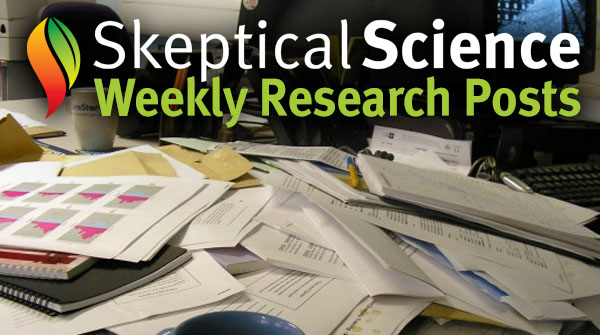
Our project to update rebuttals with an "at a glance" section continued until the end of June when the 71st updated rebuttal was highlighted and we went on a summer break afterwards. Our plan had been to pick up the slack at a slower pace and no longer on a set schedule during autumn. This however wasn't going to happen due to the project's driving force John Mason passing away very unexpectedly on September 20.
We've been collecting daily rebuttal view statistics since January 2017 and have now passed 1Mio individual records all told, making the Excel file which holds all of the data pretty large with almost 170MB in size. This data allows us to do "some" analysis of which rebuttals are viewed most often and how the Top-10 evolve over time. For this year, we looked at how 2024 compared to 2022 and 2023 for the 20 most viewed rebuttals. A few rebuttals managed to garner more views after just a few months in than they did in each of the two full previous years. Within the Top-20 most viewed rebuttals, the first month in which more than half of them had already been viewed more often than during the full 12 months of the prevous years was August as shown in the below image (click for a larger version):
Fact briefs are short, credibly sourced summaries that offer “yes/no” answers in response to claims found online. They rely on publicly available, often primary source data and documents. Fact briefs are created by contributors to Gigafact — a nonprofit project looking to expand participation in fact-checking and protect the democratic process. Fact briefs are short blog posts created since April in collaboration with Gigafact and they are closely related to our rebuttals. John Mason was also instrumental in getting this collaboration going as he helped with the drafting and reviewing of the fact briefs. See all of our published fact briefs on the Gigafact website.
Sabin Center for Climate Change Law: Rebuttals to renewable energy myths
On November 1 we announced our collaboration with the Sabin Center for Climate Change Law at Columbia Law School and published 33 rebuttals to climate change solutions denial based on their detailed report "Rebutting 33 False Claims About Solar, Wind, and Electric Vehicles". The rebuttals became available right away and we've been highlighting one of them each week on Tuesday since then. With this collaboration our thus far quite sparse rebuttal collection under the "It's too hard" category in our taxonomy increased considerably:
We reached the milestone of 20 translations for two handbooks during the year: for The Conspiracy Theory Handbook the Dutch translation was published as #19 in May and Bulgarian as #20 at the end of June. The Debunking Handbook 2020 followed suit with French in December. These translations came about due to generous offers from outside our team and the efforts of Bärbel Winkler to coordinate the work and Wendy Cook to transfer the translations into her layout files.
According to our download statistics it's apparent, that the various handbooks are still very popular. Based on available data, The Debunking Handbook was downloaded at least 42,300 times across all available languages and including both the original (published in 2011) and current version with English (15,600+), German (12,600+), Spanish (6,600+), Turkish (4,000+), Italian (2,400), Portuguese (2,400), Dutch (2,100+), Swedish (1,700+), French (1,600), Russian (1,300+) and Polish (1,200+) making up the bulk of the downloads. The Conspiracy Theory Handbook was downloaded at least 32,500 times with English (10,000+), German (2,900+), French (2,700+), Spanish (2,300+), Swedish (2,000+) Portuguese (1,900+), Polish (1,600), Dutch (1,200+), Hungarian (1,250+) making up the bulk of the downloads. In addition, The Consensus Handbook was downloaded at least 3,400 times all told in German, English and Portuguese. Also worth mentioning is that the at least somewhat dated Scientific Guide to Skepticism - published in 2010 - was downloaded more than 100K times in several languages (Czech, German, Croatian, Spanish and French garnered 9,000+ downloads each). Many more downloads will have occured from other websites where we don't have data for.
Thanks to the work of Dénes Monostori we have twelve newly created Hungarian rebuttal translations, making them the first translations into this language to make an appearance on Skeptical Science! Dénes had contacted us earlier this year via our contact form, offering to dedicate some time each week to this task. An interesting sidenote is, that Dénes's employer is granting 21 hours per year during working hours to support such volunteer activities. Quite a neat scheme to make volunteering easier for people! In addition, we also added or updated a few German rebuttal translations during the year.
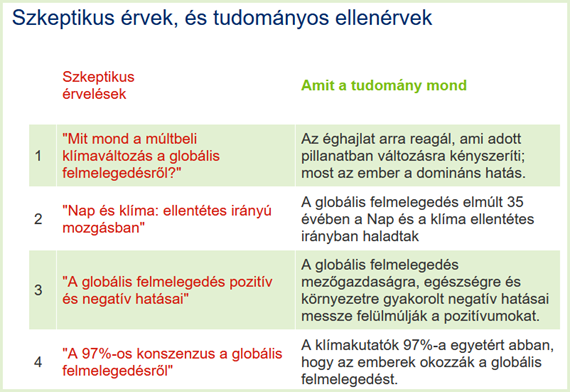
In June we were contacted by Nicole Keller from the University Heidelberg in Germany wondering if we might have suitable materials her MA translation course could translate into German during the winter-semester between October 2024 and February 2025. After some back and forth, we decided that the fact briefs (see above) would make for a neat first project for the students to hone their translation skills on. Each of the students worked on 3 translations so that most of the thus far published fact briefs were successfully translated by the end of the year. Thanks to Julia Hellwig, Damianus Pawlak, Isabel Schmitt, Yasmin Speltz, Andrei Sumcov and Ulrike Weber for the work under the guidance of Simona Füger and Nicole Keller! The full list of translated fact briefs is available here.
The FLICC-Poster is the result of a successful collaboration between Skeptical Science and our German partner website Klimafakten. It was first published in May 2020 and has been quite popular since then, helped a lot in all likelihood by the appealing design created by Marie-Pascale Gafinen. In October, the Russian and Romanian translations were published. All versions of the poster are available here.
If you are interested to get involved with our various translation projects, please check out Join the Skeptical Science Translator Community! Is this something up your alley you’d like to help with? If your answer is 'Yes', then please let us know by filling out this short form. Bärbel Winkler will then be in touch to let you know about the next steps, depending on your preferences of where you'd like to get involved.
About a year ago we decided to set up our own page on LinkedIn as we noticed that there had been a steady increase of climate-related discussions on the platform and that sharing information there can be quite effective. Since then, we've picked up 780 followers and do see quite some engagement on our posts. In order to keep some "usual suspects" in check, we set up clear rules and share most articles with comments disabled but encouraging discussions on the relevant posts here on Skeptical Science. The blog post Of red flags and warning signs in comments on social media ranked #9 in views (see above) was inspired by interactions on our Linkedin page.
Our Facebook page has been doing fairly well with around 175,000 followers, but down a bit compared to 2023. We still try to share between 3 and 5 articles per day, selecting content focusing on climate science research or combatting misinformation. On Sundays we post the link to the News Roundup from the previous week, which - judging from the impressions it generates - is quite well received as are other semi-regular posts pointing readers at the weekly research listing, the latest fact brief published or the new rebuttals from the Sabin collection highlighted on Tuesdays.
| Bluesky |
In hindsight it for sure was a good idea to already set up an account on Bluesky last year where we then had 270 followers when last year's review blog post was published. For most of the year, we only posted - skeeted(?) - rarely there but this all changed in October and November when the big "exodus" from XTwitter happened and many accounts started following us. As of right now, we have over 4,800 followers with the biggest influx happening between mid-October and beginning of December when our follower number increased from 800 to 3,800 within 6 weeks. It goes without saying that we'll now try to post as regularly as possible on Bluesky.
| Mastodon |
Our presence on Mastodon - where you can find us on the scicomm.xyz instance "tooting" as @SkepticalScience - is evolving and we now have about 2,500 followers there. Items we share on the platform get liked and "retooted" quite a bit.
| X/Twitter |
On X/Twitter we still have ca. 22,000 followers, a slight decrease compared to a year ago (and we don't really know how many of them are bots). During the year, XTwitter became less and less useful and our engagement there lapsed. We dislike where XTwitter is headed even more so than a year ago for obvious reasons, so we may well let our account go dormant and only use it to keep an eye on things every now and then.
| MeWe |
MeWe seems to be almost dead without any real activity happening. It's therefore rather likely, that we'll close shop and exit the platform in the not too distant future.
Most likely no shortage in climate myths to debunk ...
... now that Donald J. Trump has been re-elected as President of the United States of America. So, at a guess, our pre- and debunking resources will be needed a lot more than hoped for in order to give facts a fighting chance against misinformation!
Website redesign
In last year's review article we mentioned that we had started a big relaunch project for our website and today we can report that this is still ongoing. Due to events outside of our control, this project will take us well into 2025 before we'll be able to do the switch. One reason for this is that we are not "only" relaunching the fronted but are going to revamp the backend as well, which is quite a big task as you may be able to imagine. We can reveal a bit more of how Skeptical Science will look like after the relaunch, though:
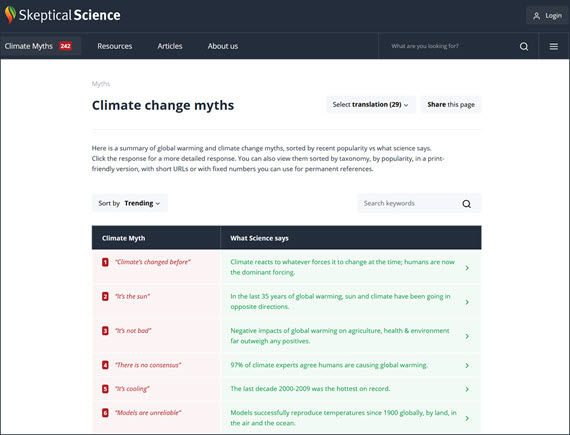
While we pride ourselves on running a highly efficient "all-volunteer" operation, the technical underpinnings of our internet-based publishing system require money for day-to-day operation as do some of our projects mentioned in this write up. You can help to propel Skeptical Science through another successful year of improving critical thinking skills as outlined below. For US taxpayers squeezing under the wire, contributions to Skeptical Science are tax-deductible.
| Skeptical Science is an all-volunteer organization but our work is not without financial costs. Contributions supporting our publication mechanisms from our readers and users are a critical part of improving the general public's critical thinking skills about science and in particular climate science. Your contribution is a solid investment in making possible a better future thanks to improving our ability to think productively, leading to better decisions at all levels of our climate change challenge. Please visit our support page to contribute. |
Translations of the FLICC-poster
| The FLICC-Poster is the result of a successful collaboration between Skeptical Science and our German partner website Klimafakten. It was first published in May 2020 and has been quite popular in English, German, Dutch, Portuguese, and Spanish since then. The creation of additional translations of the poster requires funding for professional design and layout work. You can contribute to that effort via the form provided on this page. |
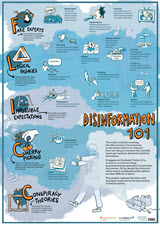 |
Translations of the Cranky Uncle Game
 |
The Cranky Uncle game adopts an active inoculation approach, where a Cranky Uncle cartoon character mentors players to learn the techniques of science denial. Cranky Uncle is a free game available on smartphones for iPhone and Android as well as web browsers. Even though the translations of the Cranky Uncle game are done by teams of volunteers, each language incurs costs for programming activities to get a language set up in the game. If you'd like to support Cranky Uncle "teaching" his science denial techniques in other languages, please use the dedicated form provided on this page to contribute. |
Thanks for reading and all the best for whatever 2025 has in store for us all!
Posted by BaerbelW on Monday, 30 December, 2024
 |
The Skeptical Science website by Skeptical Science is licensed under a Creative Commons Attribution 3.0 Unported License. |